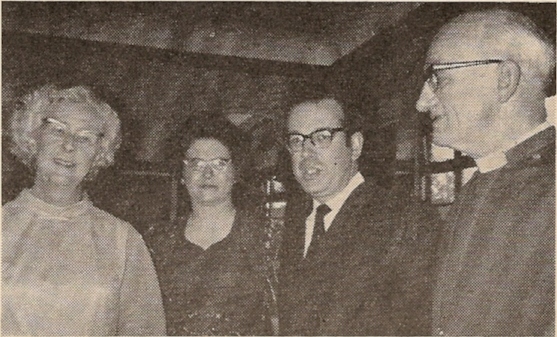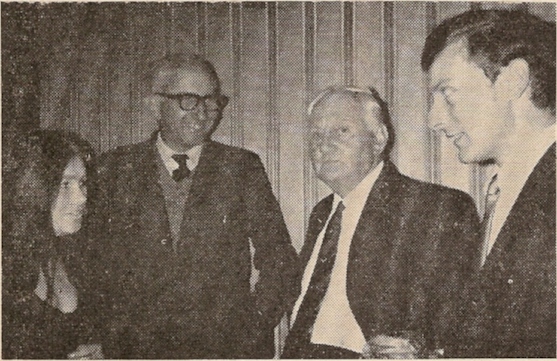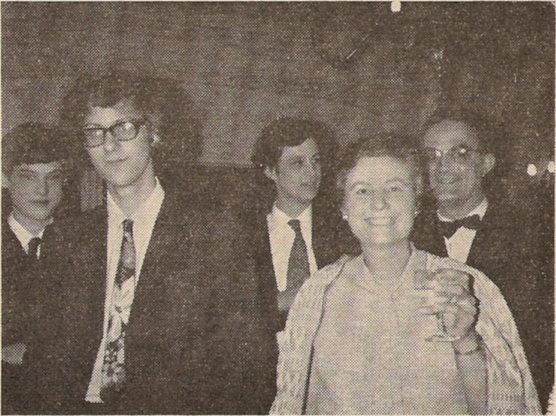 |
| Editorial |
The Ringing World No. 3184, May 5, 1972, pages 357
When the Master of the Guild (Mr. Roger Savory) mooted the idea a few years ago of holding a dinner which, if successful, would become an annual social event, he insisted on a high standard being set both in the matter of the meal and of the speeches. When the fourth annual dinner was held on April 22 at the Royal Hotel, Southampton, the meal served was superb; the speeches, although on average somewhat more lengthy than is customary at such functions, had been very well prepared and were both amusing and extremely interesting.
The committee who organised the evening are to be congratulated on the complete success of the Guild's main social event, which was a sell-out some months before the actual date.
The chairman was the Lord Bishop of Portsmouth (Dr. J. H. Phillips), who was accompanied by Mrs. Phillips. The Master (Mr. Savory) and Mrs. Savory, together with the Guild secretary (Mr. D. C. Jackson) and Mrs. Jackson, occupied prominent seats, and among the honoured guests were Mr. E. A. Barnett and Mrs. Barnett and Mr. Edgar C. Shepherd (Warminster) and Mrs. Shepherd.
Following the meal and the loyal toast, there was a short interval, following which a well-struck course of Grandsire Caters was rung by K. Croft, Mrs. M. Marshallsay, D. T. Matkin, W. Croft and J. Croft,
Proposing the toast to the Guild, Mr. Barnett spoke of ringing conditions 100 years ago and of the work of those ringers who were responsible for forming many Societies, Guilds and Associations, particularly the two clergymen who in 1879 started the Winchester Diocesan Guild. He said that when their Guild was mentioned in his hearing the name that sprang into his mind was Basingstoke (laughter). His own personal view (and he stressed it was personal) was that he saw no valid reason why, if anyone should want to ring a peal on nine bells in a 9-bell tower, should they not do it and why it should not be called a peal. Primarily, this sort of performance did not invalidate any basic principle in change-ringing, and certainly not like some performances (which he considered a fiddle) which took place periodically - such as singles in treble bob and so forth.
 |
Basingstoke also signified other things to him (the speaker). It was the birthplace of his wife's grandfather, Frank Bennett, who was a famous ringer in his day. Frank was taught to ring by Henry White, whose daughter, Alice, was the first lady to ring a peal (in 1896). She was still alive and living in Canada.
WHAT OF THE FUTURE?
That was in the past - but what of the future, asked Mr. Barnett. Can an association continue to flourish along the lines that it has always done - the traditional way: bells available 3 p.m., service 4.30, tea at 5, etc.? Is this sufficient to sustain interest among ringers generally? Do ringers come to these meetings from a sense of loyalty rather than from the prospect of gaining something from it? He felt that type of association meeting had only a limited future. Organised guilds and societies were necessary, although ringing might not continue in the way that we know it today.
He concluded by wishing continued prosperity to their Guild and asked the company to drink to the Winchester and Portsmouth Diocesan Guild.
 |
The general secretary (Mr. Derek Jackson) replied to the toast with a detailed history of bellringing through the centuries and gave some facts which were a little disturbing. One of these was that today only in one of their districts were all the bells rung for Sunday services, whilst in others less than 50 per cent, were rung.
"Now this simply will not do," said Mr. Jackson, "and I issue a challenge to the Guild. Over the next seven years I challenge you to take positive steps to ensure that, in our Centenary year, every ringable tower has a band who can celebrate the event by ringing rounds and call-changes. I further challenge all those thriving towers to spend the next seven years training and preparing, so that, in 1979 they can attempt to ring a quarter peal of Plain Bob or Grandsire on all their bells, with a band that is entirely local. I would judge that at present not more than 20 out of our 145 towers could do this!"
OVER 200 PEALS
"In peal ringing," he continued, "that yardstick of accomplishment, we have achieved great things. Thanks to the efforts of many here tonight, our very efficient Peal Recorder, Mr. Matkin, has had to work twice as hard to record over 200 peals. There were some outstanding performances, and several of our Guild rang in over 100 peals each. I must mention two people in particular: Mr. Tim Collins, present here tonight, scored 153 peals in 1971, more than any other ringer in one year. Katharine Maundrell (not present): I am informed that her peal total for 1971 is such that she will be leading lady peal ringer. [Applause]
"We hope, by next year, to have established a Guild Bell Restoration Fund, which will enable us to provide substantial assistance to towers where repairs, augmentations, rehanging, etc., are to take place. Also, by next year, we may be able to establish one-day ringing schools. It is therefore not in a mood of black depression that I end, but on a note of encouragement to an active Guild, and one of the oldest Diocesan Guilds. But don't forget," he concluded, "there are now only 6 years and 252 days left!"
Proposing "The Guests", Mr. Trueman (Romsey) spoke of a peal board in Romsey Abbey which recorded the opening of the bells with a peal by the College Youths in 1791. He often wondered how those ringers got there and how long it took them and the various hazards they had to overcome. Today the guests mostly travelled by car and could tell almost to the minute their time of arrival. A previous speaker had spoken of meetings and the future. He himself had been present in Devon last autumn, when about 400 ringers and guests had been present at Buckfast Abbey and the Dart Valley - a most imaginative programme.
Speaking of teaching learners, he said that although many ringers moved away from their home area, one tower's loss was another's gain. Indeed the University guilds were mostly made up from such ringers and were visitors at many of the local towers. Mr. Trueman made several points from the suggestions by Mr. Jackson and welcomed members of the Church present that evening, mentioning many of the clerics and their wives. He greeted ringers from other societies who were present and invited his own guild members to drink the health of the guests.
Mr. Edgar Shepherd, always a popular and accomplished speaker, replied and gave his own experiences of a visit to Southampton during World War I. He amused his hearers with several well-chosen stories and enthralled them all with a sincere speech on the duties and behaviour of guests in all walks of life. [This speech was reported in our editorial last week.- Ed.]
The chairman closed the formal part of the evening by expressing thanks to the Master and the organising committee, and an informal gathering then enjoyed the pleasures of the comfortably-appointed lounge and bars in the hotel.
* * * * *
"There's such a happy spirit here again. Everyone makes you feel that they really are pleased to meet you and are doing their best to make you at home and at ease." A comment by a lady visitor.
* * * * *
Without any knowledge of what the other speakers would talk about, three of the four whose names were on the toast list gave historic events in the course of their speeches.
* * * * *
The Bishop of Portsmouth was present at the first dinner four years ago and he said he was glad that his turn to attend had come around again. "I can't wait for it to happen again," he commented amidst laughter and applause.
* * * * *
A street map of Southampton accompanied the tickets for the Winchester and Portsmouth Guild's dinner, and the hotel was marked clearly with a red circle. To visitors this was a great help, for with all the road regulations - no parking, stopping and one-way streets - to know the area for which to make is of great assistance.
* * * * *
There was considerable disappointment that Mr. and Mrs. William Cheater were not present at the guild's dinner. They were to have been honoured guests, for Bill was for 25 years a branch ringing master.
He was, unfortunately, in hospital undergoing a hernia operation, which we understand was successful. [All the best, William - from your many ringing friends!]
* * * * *
Popular among the company was the Croft family: Ken, Madeline and their three sons; but to get them together at one time was quite an effort. When the sons were there mother and father were not, and when they arrived a son had disappeared! "It's the same at home," said Madeline, "each has his individual idea!" The Exercise as a whole and the Winchester and Portsmouth Guild in particular are pleased and proud to have such a delightfully happy and talented family amongst them.
* * * * *
Prior to the dinner, several items of ringing took place: Tim Collins and Co. scored 17-spliced; Geoff Dodd and his Andover District lads scored a peal of St. George's Minor spliced with Dragon Minor (it was St. George's Day on the Sunday) and Arthur Davis and his family, who always have a family reunion at the dinner, scored a family quarter peal.
The Ringing World No. 3185, May 12, 1972, pages 375 to 376
 |
The Ringing World No. 3187, May 26, 1972, page 421
Mr. Derek C. Jackson, general secretary, replied to the toast of the Guild at the Annual Dinner at Southampton on April 22 and had prepared many historical details, some of which we reprint below:-
Last year a contribution was sent by the W. and P. Guild to the Kent County Association towards the cost of restoring the tombstone of James Barham at Leeds in Kent. This gentleman, during the period 1744 to 1804, was the leader of band of ringers in the area near Maidstone. At this time Bonnie Prince Charlie was mustering his Highlanders prior to an invasion of England, the outcome of which would be the battle of Culloden and the establishment of a new ringing society named after the English general, the Duke of Cumberland.
At this point in history bell-ringing fell into two categories. First there was the local band, who each Sunday raised the bells and rang rounds and call-changes for the appropriate 30 minutes. Generally there were only four bells. (At the start of this period Hampshire possessed 11 fives and only two sixes, Warnford and Kingsclere). Each man rang his own bell and they were quite generously paid for their labours. "For the ringing of St. Hugh's bells and Our Lady's Bells, Lincoln - £60 per annum. Allowed ye Ringers' Gunpowder Day the sum of £4. Spent on ye ringers to drink when the Kinge was here on his holy day - £6." All of these being in today's values! It is interesting to note that even today in our Guild, two bands still receive payment for their Sunday Service ringing (in 18th century value!).
Ringers in the second category differed only in that they were influenced by the publication of two books, in 1668 and 1677, by a man called Stedman; by a society in London called the College Youths, who were ringing changes by a new scientific method; by another Society called the Norwich Scholars who had, 29 years before, rung all the 5040 triple changes possible in 3 hours and 18 minutes, at St. Peter Mancroft.
This novel method of producing changes on bells was very popular with the younger ringers, and small local societies sprang up across the country following the patterns of London and Norwich. It is noteworthy that in rural Hampshire none of this scientific stuff got through. The only local society was the Union Youths of Newport, Isle of Wight. Established in 1770 - the year Captain Cook landed on a new continent now called Australia - they rang peals of Caters and Cinques on handbells, many peals, i.e. extents on the six at Newport, and several peals of Grandsire Triples, conducted by William Rayner.
However, both types of ringer were paid employees of their local church. They were liable to fines over the breaking of their contracts.
"For smoking during ringing, 5/-.
For non-attendance, 10/-.
For reviling one another, 2/6 first time, 3/6 second time, 6/8 third time.
If any member shall go out of the steeple to drink before the Society hath done ringing (without it be with a friend), 6/-"!
In view of their terms of employment there was no obligation to attend services, and so, after ringing, they would settle down in the belfry to smoke their pipes and utilise those essential items of belfry furniture, the spittoon and the ringer's jug (one of these preserved at Macclesfield holds 20 quarts; a magnificent pewter one at Dorchester, Dorset, holds 1½ gallons). We have reason to believe that ringers were quite merry people in those days, but were regarded with horror by God-fearing people. This reputation does linger on … !
ESSENTIAL FUNCTION
One essential function of the change-ringing bands of the 1700s was to indulge in competitive ringing. Rings of eight were appearing around the countryside and bands would challenge each other in the opening ringing. Travelling vast distances on foot, each band would attempt a minimum of 5040 changes for a variety of prizes: Eight pairs of gloves; Eight velvet caps; Half-a-guinea a man; Twelve hats; 10 guineas. Thus a band of College Youths travelled from London in 1770 to open the octave at Carisbrooke; to Romsey Abbey in 1791 - the year Napoleon began his training as a French artillery officer; and to St. Peter's, Bournemouth, in 1871; to open the new six at Lymington in 1786 - the year Pitt became our youngest Prime Minister at 24; the only 6-bell band was William Rayner's Newport Youths. It is reported that when the bells at Chesterfield, Derbyshire, were opened, five different bands competed and this resulted in continuous ringing for two days as peal succeeded peal. It was about this time that George III went completely insane and the Regency had to be established for the Prince of Wales.
The 18th century had been a very low period for standards in the Church of England. It is known in history books as the period of "Fat Slumbers". In the 19th century there was a minor revolution against this by, the clergy, described by Anthony Trollope in "Barchester Towers". (It is said that all forward-looking clergy in those days took a Trollope to bed with him!) The Oxford Movement was also initiated by Keble, Pusey and Newman. sixty-one years after James Barham's death and 56 years after William Rayner's death, this renewed interest in religion and Church affairs resulted in a revolution in bell-ringing matters. On March 14th, 1871, six Oxford undergraduates rang a 120 of Grandsire Doubles together. This was the first time that University men had rung together, and from that modest beginning was formed the Oxford University Society, whose founder members were responsible for the establishment of the first of the Diocesan Guilds. On June 26th, 1879, one of them, the Rev. A. D. B. Hill, initiated the Winchester Diocesan Guild at Basingstoke, following the Devon, Durham, Lancashire and Norfolk Guilds, the aims being those still listed in the front part of the Guild Reports, under the heading Guild Rules.
I have described some past history because, in seven years' time, we shall celebrate our centenary. We should then ask ourselves, what have we done to justify our existence? How do we compare with the unsatisfactory state of ringing in the 18th and 19th centuries? First, all Guild members can state that they are now corporate members of their church's organisation, and that we ring voluntarily, solely for the interest and pleasure it gives us. Indeed some ringers are members of their church's P.C.C. Secondly, we can say that change-ringing to a very high degree of complexity has been established in Hampshire. When the Guild was founded, the only change-ringing was in three towers in the Leatherhead area of the old diocese. Thirdly, we can point to the social aspect of ringing and we have district meetings, which were unheard of in the Guild's early days, and we have a well-established Annual Dinner.
(The more mundane details of the Guild's activities were given in the report of the Dinner, R.W., page 375.)
The Ringing World No. 3189, June 9, 1972, page 468